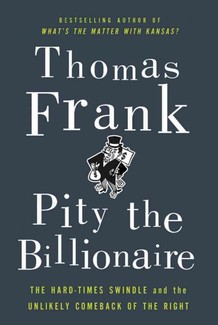Thomas Frank hits the nail on the head when describing responses to the crisis in his new book, Pity the Billionaire. First, there is the Tea Party response, which views the problem as government intervention, despite strong evidence that deregulation of financial markets and institutions is the greater culprit. Thomas Frank writes that this response was “as extraordinary as if the public had demanded dozens of new nuclear power plants in the days after the Three Mile Island disaster”:
Before the present economic slump, I had never heard of a recession’s victims developing a wholesale taste for neoclassical economics or a spontaneous hostility to the works of Franklin Roosevelt. Before this recession, people who had been cheated by bankers almost never took that occasion to demand that bankers be freed from red tape and the scrutiny of the law. Before 2009, the man in the bread line did not ordinarily weep for the man lounging on his yacht.
This naturally raises the question, what has been the response from the other side? The point that I have made before, and Frank makes in this book, is that the response from the other side has been “nothing”:
On the surface, the Tea Party line and the new revived radicalized conservatism sounds pretty good. They’re asking questions that need to be answered. Why did the regulators fail? I mean, that’s a really good question. Their theory is that, you know, it’s government. Government always fails. Right?
The important thing is what’s the answer coming from the other side? What is, say, the administration of Barack Obama? What’s their answer to the question? You know what it is? Nothing. They don’t ever talk about it.
This is the key point. The Left has not had a response to the crisis. And in my opinion, the key obstacle is that the Left does not have a theory about the crisis. This is the main difficulty that the Occupy Movement faces. And neoclassical economics has not been much use. Neoclassical economics has an obsession with general equilibrium; price changes occur when there is a shock to either demand or supply, but a new equilibrium should quickly take hold. It’s not clear that this story is at all useful: there was no external shock, rather the financial markets proved to be inherently unstable. It’s even hard to see how the concept of equilibrium is useful in our present situation.
Going forward, this is the paramount challenge to liberal economists. We need to build a new theory, one that answers these questions that so many people ask but mainstream economists cannot answer: why did the regulators fail? How can we think of markets as inherently unstable? And, as Thomas Frank warns, we want to make sure that this new theory does not pity the billionaire, as does the Tea Party response.
